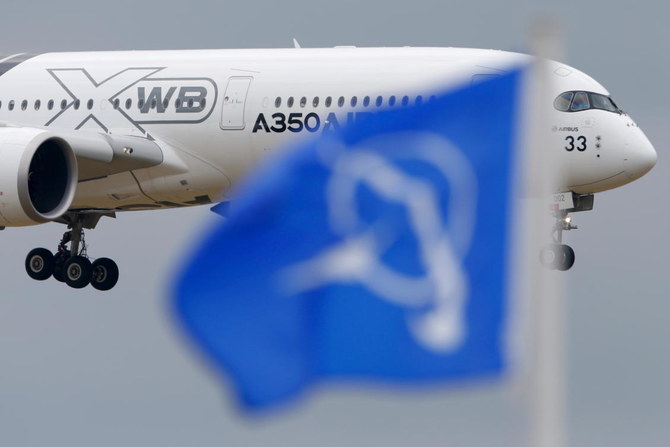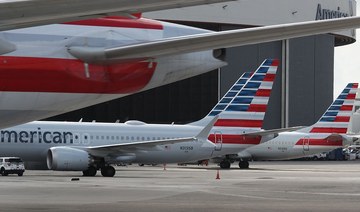PARIS: The United States and Europe are expected to announce a five-year suspension of tariffs in their 17-year-old dispute over aircraft subsidies on Tuesday, allowing them to focus on the threat posed by China’s nascent commercial aircraft industry, people familiar with the matter said.
A deal to pause the world’s largest corporate trade dispute would help US planemaker Boeing and Europe’s Airbus , while granting relief to dozens of other industries affected by tit-for-tat tariffs that were suspended in March. They face a renewed trade war within weeks if there is no progress.
US Trade Representative Katherine Tai discussed the dispute in her first face-to-face meeting with EU counterpart Valdis Dombrovskis on Monday ahead of Tuesday’s US-EU summit, where China will also be a key topic. Tai travels to Britain on Wednesday.
The European Commission, which oversees EU trade policy, and the United States had vowed to find a solution by July 11 when the currently suspended transatlantic tariffs are due to resume.
Officials had targeted a permanent solution through a pair of treaties — one between the United States and European Union, the original parties, and another between Washington and London following Britain’s exit from the EU — on new ground rules for aerospace.
But reaching a detailed accord has proven complex, given nearly two decades of legal wrangling and thousands of pages of documents, said one source briefed on the talks.
A standstill agreement would push back the resumption of tariffs by years at a time when US President Joe Biden has vowed to reset relations with European partners after four tumultuous years under former President Donald Trump.
Freezing the conflict over jet subsides, some of which have been rescinded or wound down, would give both sides more time to focus on broader agendas such as concerns over China’s state-driven economic model, several of the sources said.
The tariffs on $11.5 billion of goods were progressively imposed from 2019 after the United States and EU both won partial victories at the World Trade Organization over claims of unfair aid for Boeing and Airbus.
The dispute has dragged on since 2004 when the United States withdrew from a 1992 aircraft subsidy pact and took the EU to the WTO, claiming Airbus had managed to equal Boeing’s share of the jet market thanks in part to subsidized government loans.
The EU counter-sued over what it termed unfair R&D support and subsidized tax incentives for Boeing.
In recent months, top European, British and US officials have engaged in intense discussions to settle the dispute and focus on other challenges, including China.
Tai told Reuters in May she was optimistic about reaching a deal with Brussels, adding that the two sides needed to look at “the bigger question” of China’s ambitions to become a global player in the commercial aircraft industry.
The US has floated a joint review of aerospace funding in non-market economies like China, two of the people said.
One of the sources said the two sides had agreed to increase information-sharing, but gave no further details.
“There’s no question that the rise of China’s aircraft industry is ... on everybody’s proverbial radar,” US Chamber of Commerce Senior Vice President Marjorie Chorlins told reporters on Monday, noting what she described as China’s “heavy subsidization” of its industries.
She said settling the dispute would provide “a tremendous boost of goodwill” for broader US-European ties.
Brussels and Washington remain at odds over steel and aluminum tariffs, but are expected at Tuesday’s summit to set a Dec. 1 deadline to end punitive tariffs related to the dispute, according to a draft communique seen by Reuters.
Like the United States, the EU has sparred with Beijing on trade and security this year. But its 27 nations could struggle to agree a common front on topics like aerospace.
In April, for example, Hungary blocked an EU statement criticizing China’s new Hong Kong security law, sparking a row over the right of member states to veto EU foreign policy.
The Chinese embassy in Washington had no immediate comment.
None of the parties agreed to comment on the talks.
In a potentially key breakthrough, the United States had watered down opposition to the principle of future public loans for Airbus and removed its demand for compensation.
But its insistence on advance notice of any future public loans had triggered concerns among EU officials, who rejected giving Washington any veto power, people familiar with the talks said.
Even more critical is the benchmark to be used when deciding whether the interest on any future loans is market-compatible.
Under the 1992 subsidy pact, one third of a project could be financed by direct government support such as loans and cleared indirect R&D support up to 4 percent of a company’s revenue.
One option is to revisit that framework with market rules replacing subsidy quotas and a new cap on indirect R&D support.
Brexit has also complicated negotiations.
Britain and the United States came close to striking an aerospace agreement in December that could have forced the hand of Brussels in its own talks with Washington.
Britain’s ability to negotiate trade deals independently of the EU is central to its new “global Britain” stance. But its flexibility on Airbus is cramped by its role as one of four core nations involved in the planemaker, pre-dating its EU accession.
Airbus, which has 14,000 staff in Britain, has made plain work could shift abroad if the UK turns its back on aerospace.
After 17 years, truce nears in US-Europe jet subsidy war
https://arab.news/zpq5y
After 17 years, truce nears in US-Europe jet subsidy war

- A deal to pause the world’s largest corporate trade dispute would help US planemaker Boeing and Europe’s Airbus , while granting relief to dozens of other industries affected by tit-for-tat tariffs that were suspended in March
Open Forum Riyadh to discuss digital currency, AI, and mental health

- The event will run in parallel to the WEF’s Special Meeting on Global Collaboration
LONDON: The Open Forum Riyadh — a series of public sessions taking place in the Saudi capital on Sunday and Monday — will “spotlight global challenges and opportunities,” according to the organizers.
The event, a collaboration between the World Economic Forum and the Saudi Ministry of Economy and Planning, will run in parallel to the WEF’s Special Meeting on Global Collaboration, Growth and Energy for Development, taking place in Riyadh on April 28 and 29.
“Under Saudi Vision 2030, Riyadh has become a global capital for thought leadership, action and solutions, fostering the exchange of knowledge and innovative ideas,” Faisal F. Alibrahim, Saudi minister of economy and planning, said in a press release, adding that this year’s Open Forum being hosted in Riyadh “is a testament to the city’s growing influence and role on the international stage.”
The forum is open to the public and “aims to facilitate dialogue between thought leaders and the broader public on a range of topics, including environmental challenges, mental health, digital currencies, artificial intelligence, the role of the arts in society, modern-day entrepreneurship, and smart cities,” according to a statement.
The agenda includes sessions addressing the impact of digital currencies in the Middle East, the role of culture in public diplomacy, urban development for smart cities, and actions to enhance mental wellbeing worldwide.
The annual Open Forum was established in 2003 with the goal of enabling a broader audience to participate in the activities of the WEF, and has been hosted in several different countries, including Cambodia, India, Jordan and Vietnam.
The panels will feature government officials, artists, civil-society leaders, entrepreneurs, and CEOs of multinationals.
This year’s speakers include Yazeed A. Al-Humied, deputy governor and head of MENA investments at the Saudi Pubic Investment Fund; Princess Reema Bandar Al-Saud, Saudi Arabia’s ambassador to the US; and Princess Beatrice, founder of the Big Change Charitable Trust and a member of the British royal family.
Michele Mischler, head of Swiss public affairs and sustainability at the WEF, said in a press release that the participation of the public in Open Forum sessions “fosters diverse perspectives, enriches global dialogue, and empowers collective solutions for a more inclusive and sustainable future.”
Meituan looks to hire in Saudi Arabia, indicating food delivery expansion

SHANGHAI: Chinese food delivery giant Meituan is seeking to hire staff for at least eight positions based in Riyadh, in a sign it may be looking to Saudi Arabia to further its global expansion ambitions, according to Reuters.
The jobs ads, which is hiring for KeeTa, the brand name Meituan uses for its food delivery operations in Hong Kong, is seeking candidates with expertise in business development, user acquisition, and customer retention, according to posts seen by Reuters on Linkedin and on Middle Eastern jobs site Bayt.com.
Meituan did not immediately respond to a request for comment by Reuters on its plans for Saudi expansion.
Bloomberg reported earlier on Friday that the Beijing-based firm would make its Middle East debut with Riyadh as the first stop.
Since expanding to Hong Kong in May 2023, Meituan’s first foray outside of mainland China, speculation has persisted that its overseas march would continue as the firm searches for growth opportunities, with the Middle East rumored since last year to be one area of possible expansion.
“We are actively evaluating opportunities in other markets,“ Meituan CEO Wang Xing said during a post-earnings call with analysts last month.
“We have the tech know-how and operational know-how, so we are quietly confident we can enter a new market and find an approach that works for consumers there.”
IMF opens first MENA office in Riyadh

RIYADH: The International Monetary Fund has opened its first office the Middle East and North Africa region in Riyadh.
The office was launched during the Joint Regional Conference on Industrial Policy for Diversification, jointly organized by the IMF and the Ministry of Finance, on April 24.
The new office aims to strengthen capacity building, regional surveillance, and outreach to foster stability, growth, and regional integration, thereby promoting partnerships in the Middle East and beyond, according to the Saudi Press Agency.
Additionally, the office will facilitate closer collaboration between the IMF and regional institutions, governments, and other stakeholders, the SPA report noted, adding that the IMF expressed its appreciation to Saudi Arabia for its financial contribution aimed at enhancing capacity development in its member countries, including fragile states.
Abdoul Aziz Wane, a seasoned IMF director with an extensive understanding of the institution and a broad network of policymakers and academics worldwide, will serve as the first director of the Riyadh office.
Saudi minister to deliver keynote speech at Automechanika Riyadh conference

RIYADH: Saudi Arabia’s Deputy Minister of Investment Transaction Saleh Al-Khabti is set to deliver the keynote speech at a global automotive aftermarket industry conference in Riyadh.
Set to be held from April 30 April to May 2 in the Saudi capital’s International Convention and Exhibition Center, Automechanika Riyadh will welcome more than 340 exhibitors from over 25 countries.
Al-Khabti will make the marquee address on the first day of the event, which will also see participation from Aftab Ahmed, chief advisor for the Automotive Cluster at the National Industrial Development Centre, Ministry of Industry and Mineral Resources.
Saudi Arabia’s automotive sector is undergoing a transformation, with the Kingdom’s Public Investment Fund becoming the major shareholder in US-based electric vehicle manufacturer Lucid, and also striking a deal with Hyundai to collaborate on the construction of a $500 million-manufacturing facility.
Alongside this, Saudi Arabia’s Crown Prince Mohammed bin Salman launched the Kingdom’s first electric vehicle brand in November 2022.
Commenting on the upcoming trade show, Bilal Al-Barmawi, CEO and founder of 1st Arabia Trade Shows & Conferences, said: “It is a great honor for Automechanika Riyadh to be held under the patronage of the Saudi Arabian Ministry of Investment, and we’re grateful for their continued support as the event goes from strength-to-strength.
“The insights and support we’ve already received have been invaluable, and we look forward to continuing this relationship throughout the event and beyond.”
This edition of Automechanika Riyadh will feature seven product focus areas, including parts and components, tyres and batteries, and oils and lubricants.
Accessories and customizing, diagnostics and repairs, and body and paint will also be discussed, as well as care and wash.
Aly Hefny, show manager for Automechanika Riyadh, Messe Frankfurt Middle East, said: “The caliber of speakers confirmed to take part at Automechanika Riyadh is a testament to the event’s growth and prominence within the regional automotive market.
“We have developed a show that goes beyond the norm by providing a platform that supports knowledge sharing and networking while promoting the opportunity to engage with key industry experts and hear the latest developments, trends and innovations changing the dynamics of the automotive sector.”
Aramco-backed S-Oil expects Q2 refining margins to remain steady then trend upward

SEOUL: South Korea’s S-Oil forecast on Friday that second-quarter refining margins will be steady, supported by regular maintenance in the region, then trend upward in tandem with higher demand as the summer season gets underway, according to Reuters.
Over the January-March period, the refiner said it operated the crude distillation units at its 669,000-barrel-per-day oil refinery in the southeastern city of Ulsan at 91.9 percent of capacity, compared with 94 percent in October-December.
S-Oil, whose main shareholder is Saudi Aramco, plans to shut its No. 1 crude distillation unit sometime this year for maintenance, the company said in an earnings presentation, without specifying the time.


















